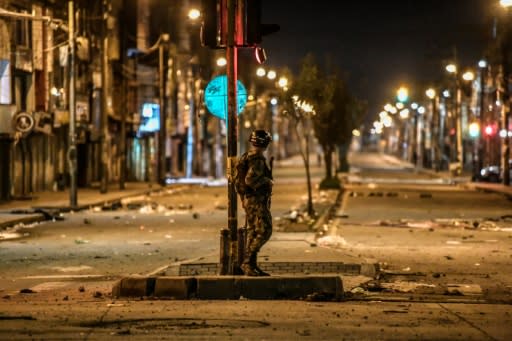Colombian protest leaders call new strike after Duque meeting
Protest leaders in Colombia called a new general strike for Wednesday after a meeting with President Ivan Duque made no progress towards ending deadly anti-government demonstrations now in their sixth consecutive day. "There is a strike tomorrow and we will continue looking at what actions we can take," said Diogenes Orjuela, head of the Central Union of Workers (CUT), following the meeting in Bogota. He said protests would continue throughout Tuesday, with cacerolazos or pot banging demonstrations taking place at midday and in the evening, as well as a candle-light rallies. The protests have left four dead -- including a young man who died Monday evening after being wounded in clashes with riot police over the weekend -- and some 500 people injured. Since last Thursday Colombia has been hit by unprecedented mass protests against the unpopular Duque, joining a wave of grassroots anger that, for different reasons, has swept through Ecuador, Chile and Bolivia. The meeting with the National Strike Committee -- which brings together unions, indigenous people, students and opposition parties -- came as part of the national dialogue Duque launched on Sunday to address corruption, economic inequality and other woes. The strike committee said it would resist government efforts to absorb it into the national dialogue and would continue to seek a separate direct dialogue with the president. "The government is trying to integrate the National Strike Committee in the context of the social dialogue it has set up with a series of bodies and organizations, which is a point of view we don't share," said Orjuela. The national coordinator of the dialogue, Andres Molano, insisted that the "national conversation" involved "all sectors" of society. The strike committee, which also includes women's and environmental organizations, made new demands in its meeting with Duque on Tuesday. Among them was a call on Duque's right-wing government withdraw its tax reform plan -- currently being debated in Congress -- and the dissolution of the feared ESMAD riot police following the four deaths. The demonstrations were initially held to demand a crackdown on drug trafficking and violence, more flexible labor market conditions and improved retirement benefits. Other groups want the government to fully implement a 2016 peace deal with the Revolutionary Armed Forces of Colombia (FARC). Colombia has been hit by unprecedented mass protests against the unpopular Colombian president Ivan Duque Demonstrators confront riot police during a protest against the government of Colombian President Ivan Duque, in Bogota, on November 23, 2019 A Colombian army soldier guards a street on November 22, 2019 in Bogota, where protest leaders called a new general strike




